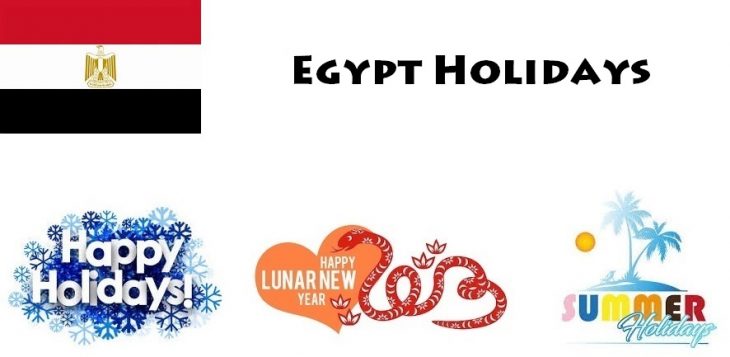Egypt Holidays
Egypt Public Holidays
Searching for the national holidays in Egypt? All public holidays in Egypt are treated like Sundays. This means that most of the Egypt employees have a day off and all schools are closed on these office holidays. If you are planning a trip to Egypt and want to know what the national and regional holidays are, check the details in the tables below.
List of Official Holidays in Egypt for Year 2020
| # | Date | Holiday | Day |
| 1 | January 07, 2020 | Coptic Christmas | Tuesday |
| 2 | January 25, 2020 | Revolution Day January 25 | Saturday |
| 3 | April 19, 2020 | Coptic Easter Sunday | Sunday |
| 4 | April 20, 2020 | Sham El Nessim | Monday |
| 5 | April 25, 2020 | Sinai Liberation Day | Saturday |
| 6 | May 01, 2020 | Labour Day | Friday |
| 7 | May 24, 2020 | End of Ramadan | Sunday |
| 8 | May 25, 2020 | End of Ramadan Day 2 | Monday |
| 9 | May 26, 2020 | End of Ramadan Day 3 | Tuesday |
| 10 | May 27, 2020 | End of Ramadan Day 4 | Wednesday |
| 11 | June 30, 2020 | Revolution Day June 30 | Tuesday |
| 12 | July 23, 2020 | Revolution Day July 23 | Thursday |
| 13 | July 31, 2020 | Eid Al Adha | Friday |
| 14 | August 01, 2020 | Eid Al Adha Holiday | Saturday |
| 15 | August 02, 2020 | Eid Al Adha Holiday | Sunday |
| 16 | August 03, 2020 | Eid Al Adha Holiday | Monday |
| 17 | August 20, 2020 | El Hijra | Thursday |
| 18 | October 06, 2020 | Armed Forces Day | Tuesday |
| 19 | October 29, 2020 | Al-Mouled Al-Nabawy | Thursday |
List of Official Holidays in Egypt for Year 2021
| # | Date | Holiday | Day |
| 1 | January 07, 2021 | Coptic Christmas | Thursday |
| 2 | January 25, 2021 | Revolution Day January 25 | Monday |
| 3 | April 25, 2021 | Sinai Liberation Day | Sunday |
| 4 | May 01, 2021 | Labour Day | Saturday |
| 5 | May 02, 2021 | Coptic Easter Sunday | Sunday |
| 6 | May 03, 2021 | Sham El Nessim | Monday |
| 7 | May 13, 2021 | End of Ramadan | Thursday |
| 8 | May 14, 2021 | End of Ramadan Day 2 | Friday |
| 9 | May 15, 2021 | End of Ramadan Day 3 | Saturday |
| 10 | June 30, 2021 | Revolution Day June 30 | Wednesday |
| 11 | July 20, 2021 | Eid Al Adha | Tuesday |
| 12 | July 21, 2021 | Eid Al Adha Holiday | Wednesday |
| 13 | July 22, 2021 | Eid Al Adha Holiday | Thursday |
| 14 | July 23, 2021 | Revolution Day July 23 | Friday |
| 15 | July 23, 2021 | Eid Al Adha Holiday | Friday |
| 16 | August 10, 2021 | El Hijra | Tuesday |
| 17 | October 06, 2021 | Armed Forces Day | Wednesday |
| 18 | October 19, 2021 | Al-Mouled Al-Nabawy | Tuesday |















































